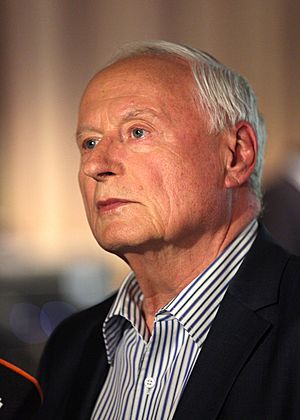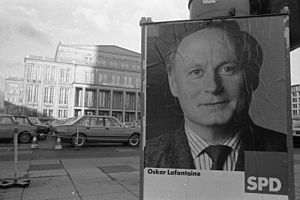Oskar Lafontaine facts for kids
Quick facts for kids
Oskar Lafontaine
|
|||||||||||||||||||||||||||||||||||||||||||||||||
|---|---|---|---|---|---|---|---|---|---|---|---|---|---|---|---|---|---|---|---|---|---|---|---|---|---|---|---|---|---|---|---|---|---|---|---|---|---|---|---|---|---|---|---|---|---|---|---|---|---|

Lafontaine in 2017
|
|||||||||||||||||||||||||||||||||||||||||||||||||
| Leader of the Social Democratic Party | |||||||||||||||||||||||||||||||||||||||||||||||||
| In office 16 November 1995 – 12 March 1999 |
|||||||||||||||||||||||||||||||||||||||||||||||||
| General Secretary | |||||||||||||||||||||||||||||||||||||||||||||||||
| Preceded by | Rudolf Scharping | ||||||||||||||||||||||||||||||||||||||||||||||||
| Succeeded by | Gerhard Schröder | ||||||||||||||||||||||||||||||||||||||||||||||||
| Leader of The Left | |||||||||||||||||||||||||||||||||||||||||||||||||
| In office 16 June 2007 – 15 May 2010 Serving with Lothar Bisky
|
|||||||||||||||||||||||||||||||||||||||||||||||||
| Preceded by | Position established | ||||||||||||||||||||||||||||||||||||||||||||||||
| Succeeded by | Klaus Ernst | ||||||||||||||||||||||||||||||||||||||||||||||||
| Minister of Finance | |||||||||||||||||||||||||||||||||||||||||||||||||
| In office 27 October 1998 – 18 March 1999 |
|||||||||||||||||||||||||||||||||||||||||||||||||
| Chancellor | Gerhard Schröder | ||||||||||||||||||||||||||||||||||||||||||||||||
| Preceded by | Theodor Waigel | ||||||||||||||||||||||||||||||||||||||||||||||||
| Succeeded by | Hans Eichel | ||||||||||||||||||||||||||||||||||||||||||||||||
| Minister-President of the Saarland | |||||||||||||||||||||||||||||||||||||||||||||||||
| In office 9 April 1985 – 9 November 1998 |
|||||||||||||||||||||||||||||||||||||||||||||||||
| Preceded by | Werner Zeyer | ||||||||||||||||||||||||||||||||||||||||||||||||
| Succeeded by | Reinhard Klimmt | ||||||||||||||||||||||||||||||||||||||||||||||||
| President of the Bundesrat | |||||||||||||||||||||||||||||||||||||||||||||||||
| In office 1 November 1992 – 31 October 1993 |
|||||||||||||||||||||||||||||||||||||||||||||||||
| First Vice President | Berndt Seite | ||||||||||||||||||||||||||||||||||||||||||||||||
| Preceded by | Berndt Seite | ||||||||||||||||||||||||||||||||||||||||||||||||
| Succeeded by | Klaus Wedemeier | ||||||||||||||||||||||||||||||||||||||||||||||||
| Lord Mayor of Saarbrücken | |||||||||||||||||||||||||||||||||||||||||||||||||
| In office 22 January 1976 – 9 April 1985 |
|||||||||||||||||||||||||||||||||||||||||||||||||
| Preceded by | Fritz Schuster | ||||||||||||||||||||||||||||||||||||||||||||||||
| Succeeded by | Hans-Jürgen Koebnick | ||||||||||||||||||||||||||||||||||||||||||||||||
|
|||||||||||||||||||||||||||||||||||||||||||||||||
| Personal details | |||||||||||||||||||||||||||||||||||||||||||||||||
| Born | 16 September 1943 Saarlautern, Saarland, Nazi Germany (now Saarlouis, Germany) |
||||||||||||||||||||||||||||||||||||||||||||||||
| Political party | BSW (2023–present) | ||||||||||||||||||||||||||||||||||||||||||||||||
| Other political affiliations |
SPD (1966–2005) WASG (2005–2007) The Left (2007–2022) Independent (2022–2023) |
||||||||||||||||||||||||||||||||||||||||||||||||
| Spouses |
|
||||||||||||||||||||||||||||||||||||||||||||||||
| Children | 2 | ||||||||||||||||||||||||||||||||||||||||||||||||
| Residence | Merzig-Silwingen | ||||||||||||||||||||||||||||||||||||||||||||||||
| Alma mater | Saarland University (Diplom) | ||||||||||||||||||||||||||||||||||||||||||||||||
| Occupation |
|
||||||||||||||||||||||||||||||||||||||||||||||||
Oskar Lafontaine was born on September 16, 1943. He is a German politician who has held many important roles. He was the head of the government in the state of Saarland from 1985 to 1998. He also led the Social Democratic Party (SPD) from 1995 to 1999.
In 1998, he became the Minister of Finance for Germany under Chancellor Gerhard Schröder. He later left the SPD and helped create a new political party called The Left. He was a leader of this party from 2007 to 2010.
Contents
Early Life and Education
Oskar Lafontaine was born in Saarlautern, which is now called Saarlouis. His father, Hans Lafontaine, was a baker who died during World War II. Oskar grew up with his mother, Katharina, and his twin brother, Hans, in Dillingen.
He went to a Catholic boarding school and then studied physics at the universities of Bonn and Saarland. He finished his studies in 1969. Before becoming a full-time politician, he worked for a company in Saarbrücken.
Family Life
Oskar Lafontaine has been married four times and has two sons. His current wife, whom he married in 2014, is fellow politician Sahra Wagenknecht.
Political Journey
Lafontaine started his political career in his local area. He became the mayor of Saarbrücken in 1976. He became more widely known when he spoke out against a plan to place missiles in Germany.
From 1985 to 1998, he was the Minister-President of the Saarland. This means he was the head of the state government. During this time, he worked hard to protect jobs in industries like steel and coal mining. He also served as the President of the Bundesrat (a part of Germany's parliament) from 1992 to 1993.
Running for Chancellor
In 1990, Oskar Lafontaine was the SPD's candidate to become the Chancellor of Germany. This election happened shortly after Germany was reunified. The government already in power was very popular, so it was a difficult election for him to win.
During his election campaign, he was attacked with a knife after a speech. He was seriously injured but recovered.
Leading the SPD and Minister of Finance
In 1995, Lafontaine was chosen as the leader of the SPD. He worked to challenge the government led by Helmut Kohl and his party.
After the SPD won the election in 1998, Lafontaine became the Federal Minister of Finance. He held this important role for about six months. He resigned in March 1999, saying there was a "lack of cooperation" in the government. After leaving, he became a critic of Chancellor Schröder's policies.
Forming The Left Party
In 2005, Oskar Lafontaine left the SPD. He then helped to create a new political party called The Left. This party was formed by combining two smaller parties. One of these was the successor to the ruling party of former East Germany.
In 2007, when The Left party was officially formed, he became one of its co-chairmen. He believed that the economy needed to be more democratic and that workers should have a bigger say in their companies.
Lafontaine continued to be active in politics in Saarland. He was the leader of the opposition in the Saarland parliament from 2012 to 2022. He left The Left party in March 2022, stating it was no longer an "alternative to the politics of social insecurity and inequality."
In 2024, Lafontaine joined a new party called Bündnis Sahra Wagenknecht (BSW). He spoke at their founding meeting in January 2024.
Works
Oskar Lafontaine has written several books about politics and society. One of his books, published in 2022, is titled Ami, it's time to go!. In this book, he discusses his views on NATO and American influence in German politics.
Images for kids
See also
 In Spanish: Oskar Lafontaine para niños
In Spanish: Oskar Lafontaine para niños
 | Shirley Ann Jackson |
 | Garett Morgan |
 | J. Ernest Wilkins Jr. |
 | Elijah McCoy |



